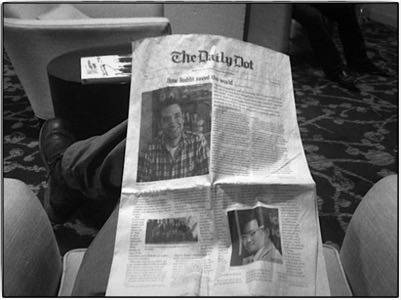I’ve never been that good at memes. I may have a pretty reliable stock of YouTube videos with which I could amuse the average non-Internet person, but compared to some Web residents, I have no idea what’s going on. That’s why I read The Daily Dot. It’s the Internet’s hometown newspaper. When I don’t know the significance of some weird video or graphic people are sharing, that’s where I turn to learn more.

Internet culture was on full display in person this week at South by Southwest, and I got a chance to sit down with Owen Thomas, founding editor of The Daily Dot, to talk about how they cover the Web not as a tool, like we do at RWW, but as a place.
ReadWriteWeb: How are you different?
The Daily Dot: We cover the Web as a place where people live their lives. I think most publications treat the Web as a set of technologies or a business opportunity. We think those are great, and those are valid things to do, it’s just not what we do. The Web is a place for us.
It’s really a world. It’s a world of little nation states. I mean, Facebook is, by population, the third largest sovereignty, you know? The kingdom of Zuckerberg. Twitter is, if you look at active users, it’s probably the size of Indonesia.
This is a place. The Daily Dot is that place’s newspaper of record.
RWW: What’s the news like in these places?
“We look for those stories about people, phenomena, ideas that are Web-native, and we cover them.”
DD: It might be something where the action is on a specific community like Reddit. It might be about a person who is just influential online like Ben Huh. Something going viral as a Facebook share I think is just so dead-center to what we do. We’ve made animated GIFs a regular feature. That’s not something that exists anywhere except the Internet. That particular form of short-form animation that can be spread in a Twitter message is native to the Web.
So we look for those stories about people, phenomena, ideas that are Web-native, and we cover them.
RWW: Daily Dot reporter Kevin Morris said on Twitter that he was “so, so happy” about The Daily Dot not covering the iPad launch last week. What is a gadget in this world you cover?
DD: Gadgets are kind of like cars. You use them to get from place to place. But you don’t really think about them unless there’s a miles-long traffic jam, and suddenly that becomes news.
RWW: These places you cover are always changing. They’re changing their rules, they’re growing or shrinking. How do you adjust to the shifting landscape?
“Web communities, by their nature, are very, very fluid.”
DD: One design decision we made early on, which we’re now in the process of correcting, is we kind of hard-coded into our site these various communities. What we discovered was that there are new communities that rise and fall.
Web communities, by their nature, are very, very fluid. While it’s hard to be a citizen of multiple countries in the real world, online you can be an active citizen of multiple communities, and you can teleport from place to place instantly.
Our original concept that we would have beat reporters dedicated to specific communities has worked in some regards. But what if a YouTube video goes viral because it’s on the front page of Reddit? Is that a Reddit story or a YouTube story? Which reporter covers it? We’ve had to say it’s sort of up for grabs.
So our beat system has become much more fluid in recognition of the realities of the communities we cover.
RWW: When you cover a major issue within one of these communities, like Fruzsina Eördögh‘s recent series on YouTube reply girls, is it ever hard to translate the importance of that issue to the outside world?
DD: That’s our job. It is what we do. We are explaining the Internet to the world.
You can read The Daily Dot at dailydot.com.

















